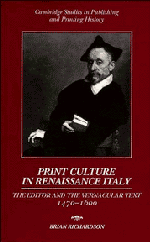Book contents
- Frontmatter
- Contents
- Preface
- Acknowledgements
- Abbreviations
- Note on transcription
- 1 Printers, authors and the rise of the editor
- 2 Editors and their methods
- 3 Humanists, friars and others: editing in Venice and Florence, 1470–1500
- 4 Bembo and his influence, 1501–1530
- 5 Venetian editors and ‘the grammatical norm’, 1501–1530
- 6 Standardization and scholarship: editing in Florence, 1501–1530
- 7 Towards a wider readership: editing in Venice, 1531–1545
- 8 The editor triumphant: editing in Venice, 1546–1560
- 9 In search of a cultural identity: editing in Florence, 1531–1560
- 10 Piety and elegance: editing in Venice, 1561–1600
- 11 A ‘true and living image’: editing in Florence, 1561–1600
- Conclusion
- Notes
- Select bibliography
- Index of Italian editions 1470–1600
- Index of manuscripts and annotated copies
- General index
4 - Bembo and his influence, 1501–1530
Published online by Cambridge University Press: 01 June 2011
- Frontmatter
- Contents
- Preface
- Acknowledgements
- Abbreviations
- Note on transcription
- 1 Printers, authors and the rise of the editor
- 2 Editors and their methods
- 3 Humanists, friars and others: editing in Venice and Florence, 1470–1500
- 4 Bembo and his influence, 1501–1530
- 5 Venetian editors and ‘the grammatical norm’, 1501–1530
- 6 Standardization and scholarship: editing in Florence, 1501–1530
- 7 Towards a wider readership: editing in Venice, 1531–1545
- 8 The editor triumphant: editing in Venice, 1546–1560
- 9 In search of a cultural identity: editing in Florence, 1531–1560
- 10 Piety and elegance: editing in Venice, 1561–1600
- 11 A ‘true and living image’: editing in Florence, 1561–1600
- Conclusion
- Notes
- Select bibliography
- Index of Italian editions 1470–1600
- Index of manuscripts and annotated copies
- General index
Summary
The editing of dante and petrarch in Venice at the end of the fifteenth century was, we saw in the previous chapter, drifting ever further from authenticity. Each successive edition was only superficially new, since each was based on a source text printed only a few years earlier. There were, though, already signs of dissatisfaction with this situation. Editors were making efforts to remove the northern patina which in the Venetian tradition had come to overlay the original Tuscan, and in 1500 Nicolò Peranzone openly voiced criticisms of the state of the text both of Petrarch and of his commentators, though his edition was in fact little better than its predecessors.
The consciousness among editors that the text of Petrarch presented a problem which urgently needed to be addressed in a fresh way was a consequence, no doubt, of a growing interest in the poet among men of letters in northern Italy. Already by the early 1490s Giovanni Aurelio Augurello was trying in the Veneto to close the gap between humanism and a serious study of the vernacular, urging other humanists to study Petrarch's Italian verse, and arguing in the early years of the Cinquecento in favour of a strict adherence to Petrarch as a poetic and linguistic model. One of those whom he had probably already influenced in this respect was the young Venetian patrician Pietro Bembo, and it was Bembo who edited the first Petrarch and the first Dante to appear in the Cinquecento, respectively in July 1501 and August 1502.
- Type
- Chapter
- Information
- Print Culture in Renaissance ItalyThe Editor and the Vernacular Text, 1470–1600, pp. 48 - 63Publisher: Cambridge University PressPrint publication year: 1994



